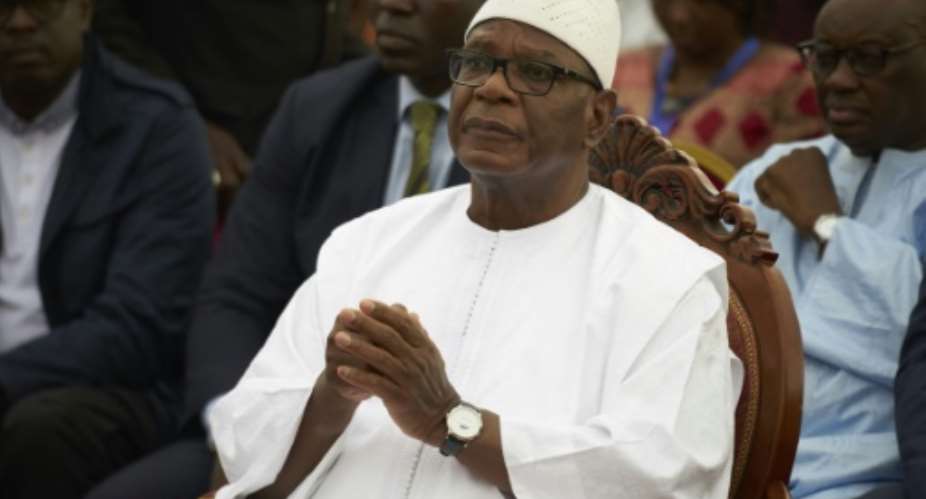Malian President Ibrahim Boubacar Keita, seized by mutinous troops on the heels of a weeks-long political crisis, has long relied on an uncompromising image to project command over his West African country.
But the man who won election in a landslide in 2013 and was re-elected in 2018 has been left flailing by jihadist and inter-ethnic violence that has claimed thousands of lives and forced hundreds of thousands to flee their homes.
Snail-paced political reforms, a flagging economy, decrepit public services and schools and a widely shared perception of government corruption have also fed anti-Keita sentiment, driving tens of thousands of protesters into the streets.
The 75-year-old head of state has been able until now to shrug off the criticism of a divided opposition, partly relying on support from the international community which has seen him as a bulwark against the jihadist threat.
But the coronavirus pandemic and the kidnapping of opposition leader Soumaila Cisse by jihadists in March made severe inroads into Keita's standing.
The political veteran known as IBK is described variously by his entourage as generous, irascible and divisive.
He is also surgically precise in his French, prone to using the imperfect subjunctive -- a mode usually only seen in high-flown literature -- in his speeches.
The son of a civil servant, Keita was born in the southern industrial city of Koutiala, the declining heartland of cotton production.
After studying literature in Mali, Senegal and France -- his great-grandfather was a French colonial soldier who died in the Battle of Verdun in World War I -- Keita became an advisor for the EU's overseas development fund before heading a development project in northern Mali.
He campaigned against general Moussa Traore, Mali's former president ousted in 1991 by a military coup.
He then rose through the ranks under Alpha Oumar Konare, the country's first democratically elected president.
As a socialist prime minister between 1994 and 2000, he quelled a series of crippling strikes, earning a reputation as a firm leader and helping to set up his landslide election in 2013 -- when he finally ascended to the presidency after losing runs in 2002 and 2007.
He had campaigned as a unifying figure in his fractured country, belying his tough-talking reputation. Keita was re-elected in 2018, defeating Cisse.
Rumours regularly surface about Keita's health, which he has also dismissed: "It may surprise a lot of people, but I feel perfectly fine."





 This IMANI job no dey pap; the people you are fighting for are always fighting y...
This IMANI job no dey pap; the people you are fighting for are always fighting y...
 Prof. Naana Opoku-Agyemang has changed; you can see a certain sense of urgency –...
Prof. Naana Opoku-Agyemang has changed; you can see a certain sense of urgency –...
 MFWA Executive Director slams Akoma FM for engaging in ‘irresponsible’ media pra...
MFWA Executive Director slams Akoma FM for engaging in ‘irresponsible’ media pra...
 ‘Women must become millionaires too’ — Prof Jane Naana on establishment of Women...
‘Women must become millionaires too’ — Prof Jane Naana on establishment of Women...
 Some believe only in Ghanaian votes, not Ghana — Kofi Asare jabs politicians
Some believe only in Ghanaian votes, not Ghana — Kofi Asare jabs politicians
 Plan to make BEST sole aggregator of Sentuo Oil Refinery will create market chal...
Plan to make BEST sole aggregator of Sentuo Oil Refinery will create market chal...
 2024 elections: I can't have the man I removed from office as my successor — Aku...
2024 elections: I can't have the man I removed from office as my successor — Aku...
 2024 Elections: Immediate-past NPP Germany Branch Chairman garners massive votes...
2024 Elections: Immediate-past NPP Germany Branch Chairman garners massive votes...
 Gov’t focused on making Ghana energy self-sufficient, eco-friendly – Akufo-Addo
Gov’t focused on making Ghana energy self-sufficient, eco-friendly – Akufo-Addo
 April 25: Cedi sells at GHS13.74 to $1, GHS13.14 on BoG interbank
April 25: Cedi sells at GHS13.74 to $1, GHS13.14 on BoG interbank
